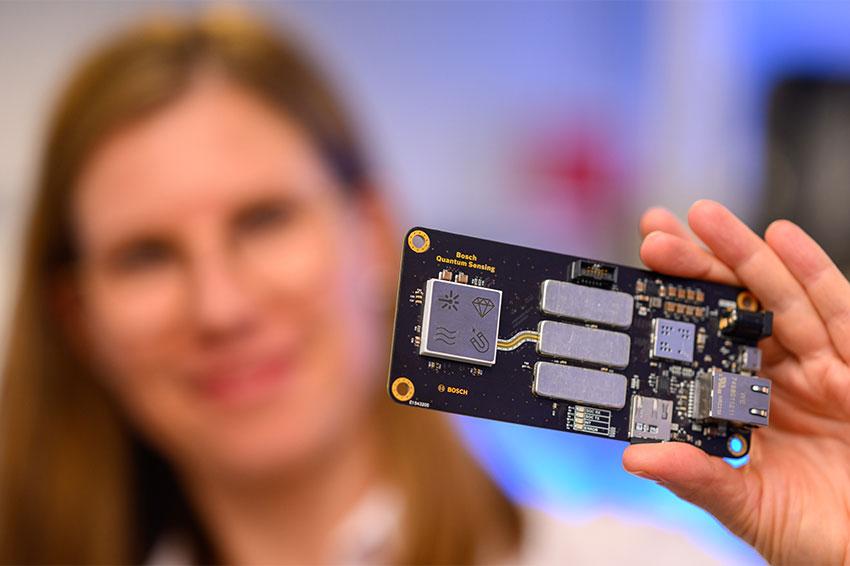Integrating quantum sensors onto chips
Medicine: Bosch quantum sensors could help save lives in the future
Quantum technologies have great potential, but most of this potential is still a distant dream at present. Following ten years of research in this field, Bosch is now planning to work with the first pilot customers in the medical and mobility industries on specific applications over the next two years. At the startup Bosch Quantum Sensing, established at the beginning of 2022, some thirty associates are currently focusing on this. Bosch estimates the annual global market potential of applications for medicine and mobility will reach the mid-single-digit billions by the middle of the next decade.
One potential area of application for quantum sensors, the brain-computer interface (BCI), will on its own be worth more than five billion dollars annually in the long term, according to the company’s calculations. One example of its future use is sensors that record nerve impulses in order to control artificial limbs and thus improve patients’ quality of life. “The quantum sensors we are creating in medical technology are a perfect fit for our ‘Invented for life’ ethos. By the end of the decade, we want to take a leading position with our technology,” says Dr Stefan Hartung, chairman of the Bosch board of management.
When it comes to size, the technology company is already a frontrunner: in terms of its measurement accuracy, the Bosch sensor prototype is the smallest currently available – about the size of a cell phone. Its compact design offers considerable advantages wherever space is at a premium – for example, in industrial applications, in vehicles, in aircraft, or even in hospital emergency rooms. The smaller the sensor, the greater the benefits: smaller sensors are portable, cheaper to produce, and more scalable as a result. “Our goal is to miniaturize quantum sensors to the point where they can be integrated onto a chip,” says Dr Katrin Kobe, who is responsible for sensor commercialization at Bosch Quantum Sensing. This could lead the way to additional sensor applications.
Bosch’s quantum sensor prototype is currently about the size of a cell phone and is the smallest currently available with this level of measurement accuracy right now, but of course, much more advanced sensors will come in the not too distant future, as Kobe describes in her article for the “photonics for quantum technology” focus section in the new issue of PhotonicsViews.
Over the next two years, Bosch Quantum Sensing plans to work on specific applications with pilot customers in the medical and mobility sectors. Brain computer interfaces (BCIs) remains the long-term strategic target market for quantum sensors – but the number of other possible applications is huge. It is going to be an exciting journey to see where and how this technology improves and transforms our world.
Reference: K. Kobe (Bosch Quantum Sensing): Robust, compact quantum sensors to deliver unprecedented precision, PhotonicsViews 21(1), February / March 2024, pp. 33–35; DOI: 10.1002/phvs.202400003
Further reading: Exceeding expectations – Review: Quantum Effects, 10–11 October 2023, Stuttgart, Germany, wileyindustrynews.com, 13 October 2023
Contact
Bosch Quantum Sensing
a division of Robert Bosch GmbH, Robert-Bosch-Platz 1
70839 Gerlingen-Schillerhöhe
Germany
+49 711 400 40990






